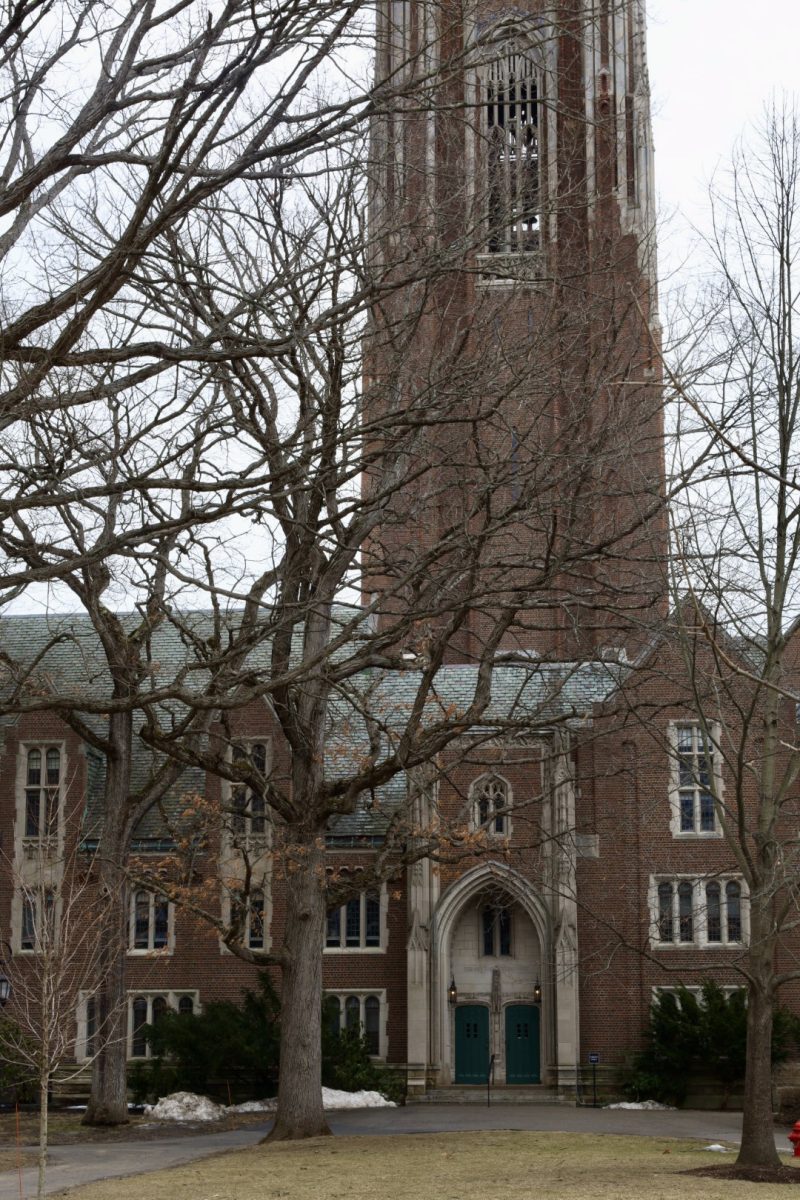Emergency contraception on Wellesley’s campus will become more accessible and affordable by the end of the 2023-2024 school year with the addition of an emergency contraception vending machine, a project spearheaded by the Sexual Health Educators, a student peer health educator group on campus who work with the Wellesley College Office of Student Wellness to provide medically comprehensive and equitable education and outreach in the area of sexual health, informally known as the SHEs. Until the installation of the vending machine, the only avenue to get emergency contraception on campus is through Health Services. Co-presidents Sofía Hernández Santillán ’24 and Coco Plasencia ’24, along with general member Chloe Guntrip ’26, have finalized details for the vending machine, including requesting and receiving a recreation grant of $2,673 during senate on Monday, May 4.
“We won’t take all the credit. It’s actually been in the running within the SHEs for about three years now,” said Plasencia.
According to Plasencia, conversations about the vending machine started with their former president, Asia Korkmaz, SHEs president for 2021-2022 school year. She facilitated conversations with Health Services and the SHEs Advisor, Allison Weinberg, director of Student Wellness. The project was taken on by SJ Stevens and Olivia Rivera, SHEs co-presidents for the 2022-2023 school year. They helped navigate discussions with health services and administration. Plasencia, Hernández Santillán and Guntrip are working on acquiring funding and collaborating with other organizations.
“Essentially, we’ve had the groundwork laid out and we’ve been working on logistics this year, going through senate, and going through all of the proceedings to actually put it in place,” said Hernández Santillán, “We’re hoping that this semester, it’s a done deal.”
Project collaborators include Wellesley for Reproductive Justice (WRJ) and Wellesley Community Care, both of which assisted with sourcing the emergency contraception through Advocates for Youth, a nonprofit organization and advocacy group dedicated to sexual education, HIV prevention, sexually transmitted diseases/infections prevention, teenage pregnancy prevention, access to contraception, equality for LGBTQ+ youth and youth participation,” according to their website. According to Plasencia, the SHEs also have connections to other organizations that can provide emergency contraception for free to keep the machine self-sustaining.
“We have established this throughout our e-board, which consists of mostly younger students. Since [the co-presidents] are graduating, we’ve established this is something that’s going to be a constant collaboration between orgs, between the Office of Student Wellness, and it’s something that will hopefully keep sustaining itself for future years to come,” said Plasencia. Plasencia hopes that, in the future, other organizations such as PERIOD will be involved and notes that, once the machine is established, a larger committee will be formed.
Together, members of the committee will help to ensure that the machine stays stocked with Plan B One-Step, an emergency contraception that does not require a prescription. Plan B One-Step (levonorgestrel 1.5 mg) both prevents the release of the egg and attachment of the egg to the uterine wall and prevents/delays ovulation. It should be noted that Plan B One-Step, (and other levonorgestrel varieties) are not the same as mifepristone, the medication used in medical abortions. They function differently in that mifepristone induces hormonal changes that cause the uterine lining to shed after a fertilized egg has already attached to the uterine wall and begun to develop.
According to One-Step’s package, the pill can be taken by mouth for up to five days after unprotected penetrative sex, but it’s most effective within three days. More information about the product will be posted behind the machine when it arrives at its location. This sheet will have information on how to safely take the medication, risk factors and information about how to access appropriate on and off campus resources, including Health Services, the Office of Student Wellness, Planned Parenthood and more.
The machine will be placed outside of the Office of Student Wellness, located in Billings, which is open seven days a week from 8 a.m. to 12 a.m. There are no cameras in the building and the building is only swipe-access available. The supply of emergency contraception will also be kept in the Office of Student Wellness, in order to prevent the responsibility from being on a member of the SHEs.
“We’ve chosen the location very strategically,” said Plasencia. “We tried to make it as private as possible.”
Hernández Santillán agreed, noting that the project participants have been in touch with other institutions that have installed emergency contraception vending machines.
“There have been instances at other schools that we’ve interacted with in terms of gathering resources, other schools that have emergency contraception vending machines, and they have experienced some pushback. That’s why we are trying to make attempts to have this near the Office of Student Wellness where someone can keep an eye on it at all times,” said Hernández Santillán.
Allison Weinberg alongside Nancy Baden, outreach nurse educator, will oversee the stock of contraception available in the machine. Additionally, they’re going to replenish the quarters and nickels next to the machine used to pay for the five-cent contraception packages. Because of the supply of change, emergency contraception will be completely free to students.
According to Plasencia, previous methods of obtaining contraception via Health Services or CVS Pharmacy posed barriers to students concerned about the $50 cost of the drug, the record of obtaining contraception on insurance statements, and those unable to find an appointment within the efficacy window. “We haven’t found another option for something that’s so low cost without going through health services,” said Plasencia, “We’re happy to be able to provide this resource for students for free.”
Hernández Santillán explained that the machine is important because the demand for emergency contraception on Wellesley’s campus has been high.
“[The demand for emergency contraception] is pretty big to the point where the Office of Student Wellness has approached us. There have definitely been hoops to jump through, but it’s a huge need on campus. We didn’t even feel the need to make a petition or anything like that, just because of what’s been spoken about in conversation and what’s been told to us as the SHEs,” said Hernández Santillán. “There’s been logistical hoops. And just making sure that if we’re putting this resource on campus, people can access it safely with all of the information that they need to know about the product.”
An obstacle that Hernández Santillán, Plasencia and Guntrip have faced is the fact that the Plan B One-Step pill may not be effective for those who weigh more than 165 pounds. The alternative is a prescription drug named ella (ulipristal acetate).
“Unfortunately, that’s prescription based and we have not yet figured out a way to put that in the machine without having a doctor’s note. Sometimes people ask us if they can take two Plan Bs instead of one ella and that’s not the case,” said Hernández Santillán.
Plasencia hopes to add ella to the vending machine’s stock in the future. “We want it to be accessible to everyone. We know that Plan B One-Step is not accessible to everybody. That would be a long-term goal,” she added. Health Services can assist in getting prescriptions for ella and help navigate delivery to campus from Andrew’s Pharmacy.
Hernández Santillán shared that the SHEs are planning on having a proper unveiling and opening of the vending machine with the Office of Student Wellness and other organizations.
“It’s been a long time coming. Coco and Sofía especially have done so much work with talking to different people and corresponding with other schools, so it wasn’t something that just spontaneously happened. I’m very proud of them and everything they’ve done to help the student body,” said Guntrip.




